Today marks the 20th anniversary of the formation of the New Possibilities Group.

I can't believe it went by so fast... On December 11th, 2000, our company was formed in the state of New Jersey. Since then, it's been a hell of a ride! This week, I'm going to walk a bit down memory lane, talk about growing an agency, speak about what's changed, and talk about where we're going, not only as a company but the industry as a whole. For the most part, hopefully, this provides some insight into who we are and what we do for both existing clients and prospective ones. And, it'll be a bit personal, too.
First, In the Beginning…
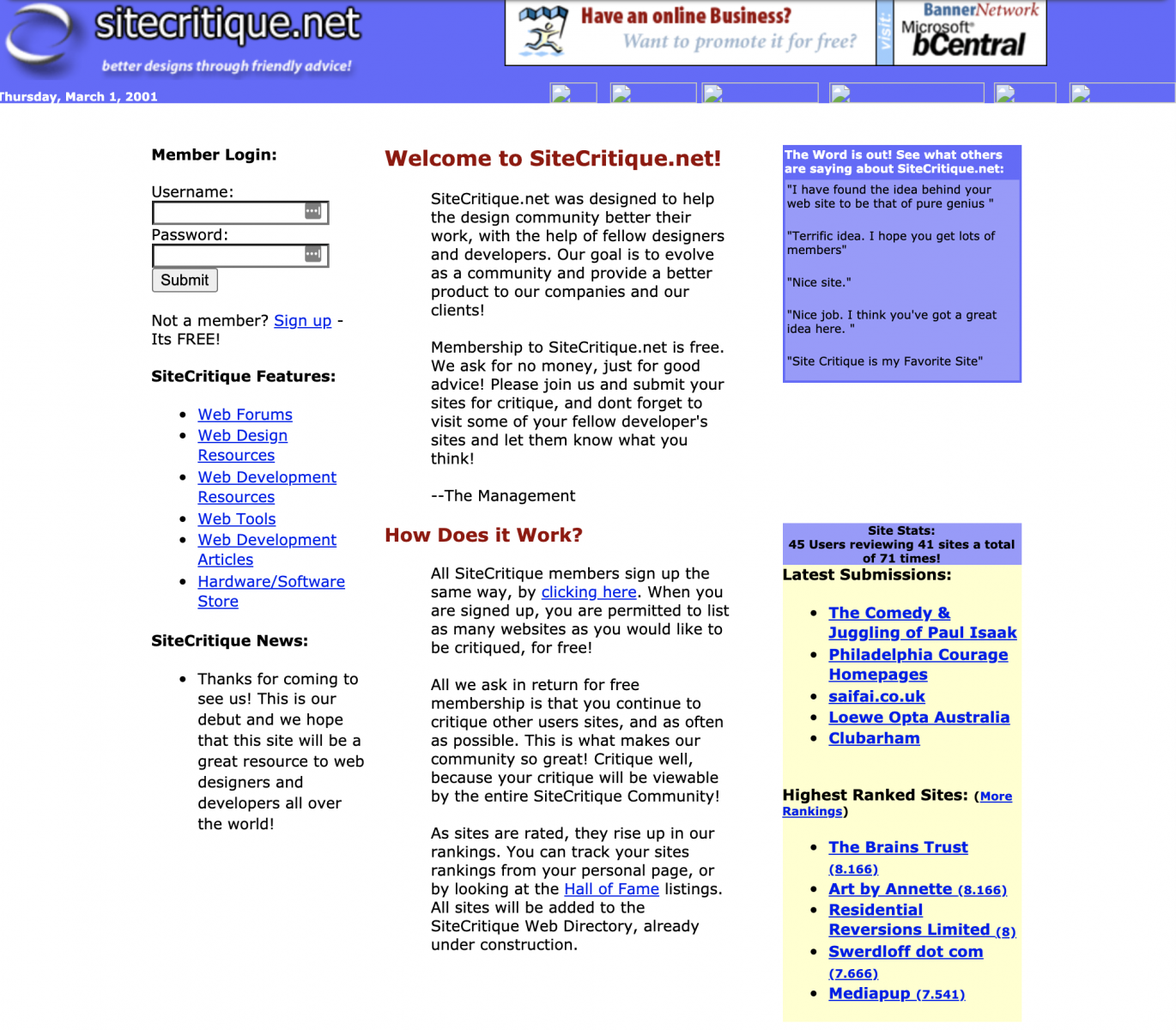 Without going too far back in time, I might as well review how I got into the digital space. I went to university for television broadcasting in 1996. But, I was always into computers. I had two engineers in the family, so I was always around computers growing up. Around 1992, I taught myself Visual Basic and made simple PC-based applications pretending to be the next Microsoft. However, it wasn't until we hooked up to the internet that programming was of significant interest to me. I saw early that the internet could eventually be a medium that converges with TV but does so much more. This caused me to pivot away from my TV production skills (which are questionable, as I was stuck being the audio man 16 weeks in a row – not a desirable role…) and focus on web development. So, I taught myself to be an open-source coder and began a computer science minor at Montclair State University, where I went to school. Then, I came up with an idea for my first website: SiteCritique.net, a community of designers who rated and reviewed each other's websites (see screenshot for my design aesthetic). That site eventually would have 5,000 members and provide a small income stream.
Without going too far back in time, I might as well review how I got into the digital space. I went to university for television broadcasting in 1996. But, I was always into computers. I had two engineers in the family, so I was always around computers growing up. Around 1992, I taught myself Visual Basic and made simple PC-based applications pretending to be the next Microsoft. However, it wasn't until we hooked up to the internet that programming was of significant interest to me. I saw early that the internet could eventually be a medium that converges with TV but does so much more. This caused me to pivot away from my TV production skills (which are questionable, as I was stuck being the audio man 16 weeks in a row – not a desirable role…) and focus on web development. So, I taught myself to be an open-source coder and began a computer science minor at Montclair State University, where I went to school. Then, I came up with an idea for my first website: SiteCritique.net, a community of designers who rated and reviewed each other's websites (see screenshot for my design aesthetic). That site eventually would have 5,000 members and provide a small income stream.
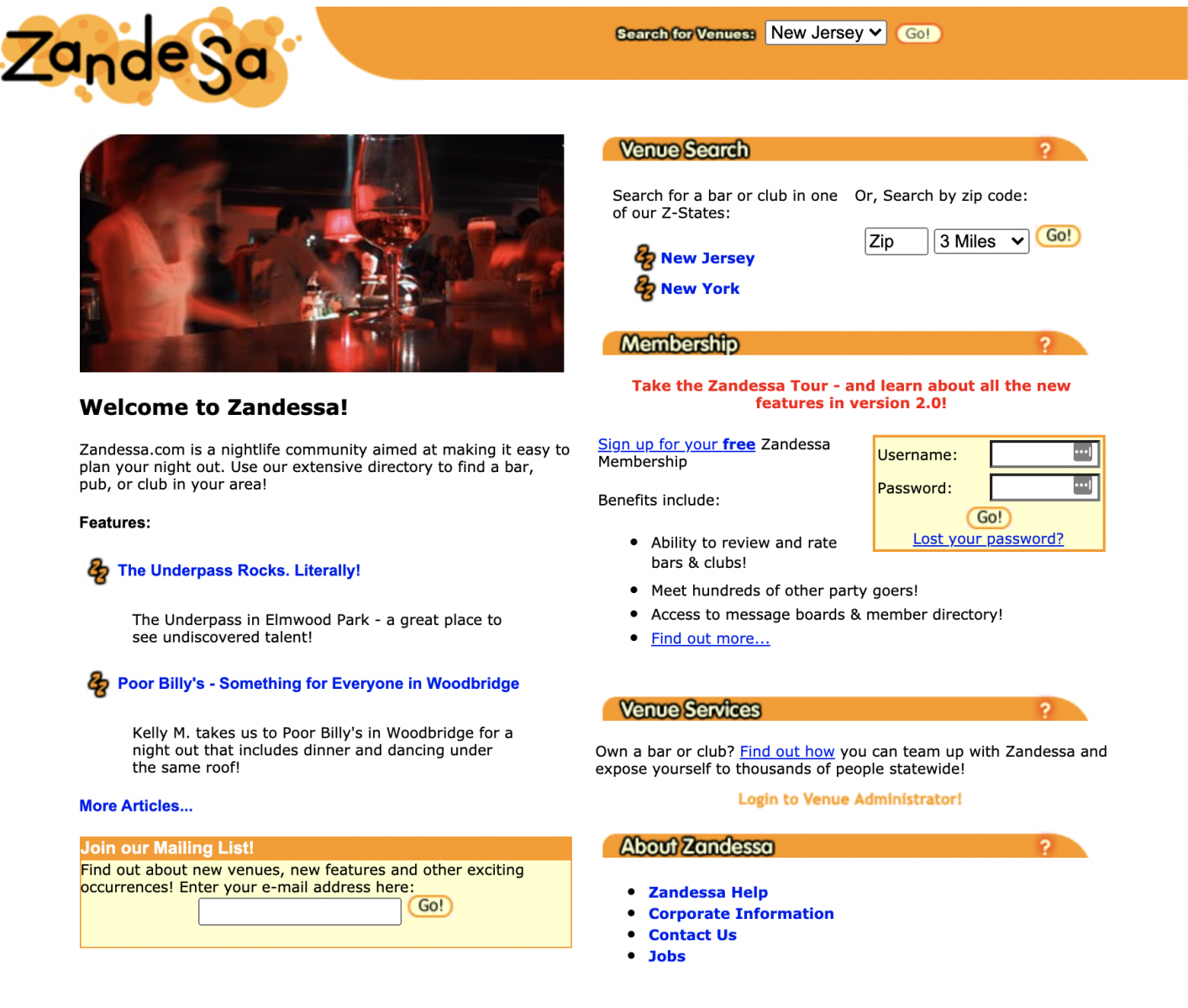 In the summer of 1999, I was on a study-abroad program in Siena, Italy, where I met another guy on the same trip who also happened to be the only other dude carrying a notebook computer with him (nerd alert!). Fast forward a year, and the New Possibilities Group was started by myself and Kris LaGreca, the guy with the computer. Credit goes to Kris for naming the company. Initially, we didn't intend to actually perform consulting services. We had a social network platform we were building, called Zandessa, and needed to incorporate it to make any money. It was a nightlife-targeted social network, where bars and clubs would have profiles. Users could register and make "friends," and there were internal messaging capabilities.
In the summer of 1999, I was on a study-abroad program in Siena, Italy, where I met another guy on the same trip who also happened to be the only other dude carrying a notebook computer with him (nerd alert!). Fast forward a year, and the New Possibilities Group was started by myself and Kris LaGreca, the guy with the computer. Credit goes to Kris for naming the company. Initially, we didn't intend to actually perform consulting services. We had a social network platform we were building, called Zandessa, and needed to incorporate it to make any money. It was a nightlife-targeted social network, where bars and clubs would have profiles. Users could register and make "friends," and there were internal messaging capabilities.
In general, I feel we were years ahead of the social networks with many of the same features. But, the idea fizzled. Kris went back to school in California, and I took a job managing web development for a casual game company, which you'd think would be a lot of fun, but well.. more on that in a minute. After that, I joined a start-up in the action sports world to pay the bills and escape office work – the position was remote long before that was a thing. Throughout the years, though, we routinely were asked by people if we could help them build a website or a simple application. Truth is, NP Group became an agency kind of by accident. This is a typical story with digital agency owners in my age range (I just turned 42). Many of us came around at the right time when people wanted to embrace a medium but had no idea how. Some of us got lucky and made it into a sustainable business. For the most part, start-up costs were low. We put in, if I recall correctly, $500 per partner. And most of that was spent incorporating.
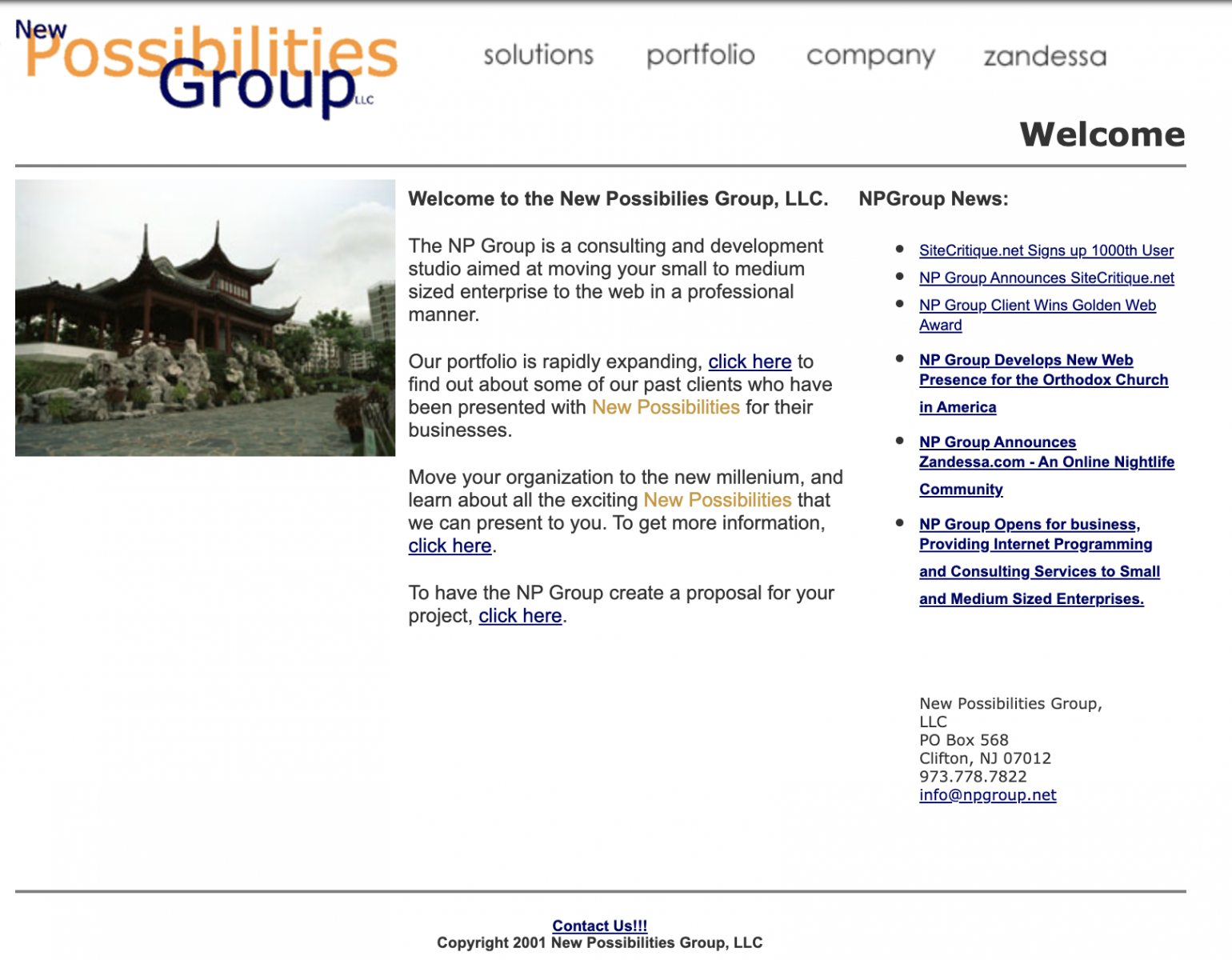 When something happens by accident, you typically react rather than taking the time to plan. That is somewhat the story here, too. Around 2009, the requests started to be more than what I could handle, given the inconvenience of a full-time job. Also, in full disclosure, I'm an awful employee. I always knew I'd be happiest doing something where I had some freedom over decisions, workflows, and had a variety of projects to work on. So, I transitioned full-time into running the agency and doing work for a handful of clients. There isn't much of a secret to how we did this – people asked if we could do something and the answer typically was yes. We built a strong base network of folks in our industry that referred us to the right people. Many of them still are customers or referring us work today. And, we continued to build our skill set and expanded our team. By 2009, I was already working with a reliable development team offshore, and we formalized that into a permanent relationship. They are still our team today.
When something happens by accident, you typically react rather than taking the time to plan. That is somewhat the story here, too. Around 2009, the requests started to be more than what I could handle, given the inconvenience of a full-time job. Also, in full disclosure, I'm an awful employee. I always knew I'd be happiest doing something where I had some freedom over decisions, workflows, and had a variety of projects to work on. So, I transitioned full-time into running the agency and doing work for a handful of clients. There isn't much of a secret to how we did this – people asked if we could do something and the answer typically was yes. We built a strong base network of folks in our industry that referred us to the right people. Many of them still are customers or referring us work today. And, we continued to build our skill set and expanded our team. By 2009, I was already working with a reliable development team offshore, and we formalized that into a permanent relationship. They are still our team today.
So, that's the background story. Now, let's dig into the insights I've gathered in the past 20 years.
Lessons Learned
Escaping the Comfort Zone
I remember when I rented my first office. It fit the two of us (we'd eventually squeeze in FOUR!). I'd say it was 400 square feet, and the rent was $750 per month. I was nervous; it seemed like a big step, after all. Any time your name is signed on paperwork, it's a big deal, right? Not really. Turns out it was a very smart thing to do. I enjoyed that small office. Without going just a bit outside your comfort zone, you will never expand it. I find that historically, every time I pushed my personal boundaries just a bit I grew a great deal as well. We bought our first house with literally 1% down, as an example. It's never a good sign when your own attorney (who you are related to!) asks you at closing "how are you gonna pay for this!"? But, you use that as a motivator and make it work, and the next step is always bigger and better.
By the way, on the note of office space, I'd say that this is an area where I see much change in the industry. Today, businesses are going increasingly virtual, and COVID really accelerated that process. As a business owner, we went from 400 sq ft to 3,500 and back to 1,700. Now I'm unsure I even need that. The fact is, people can do great work anywhere, and communication tools are better than ever. I've never been one that wanted to spend the money on insane workspaces. People don't need exposed brick to work well. They need to get home on time and have some balance (more on that in a bit).
Scaling
 Over the years, we grew, scaled back, and grew again. One lesson, in particular, is the idea of scale and growth. If I could give one piece of advice to new agency owners, it would be to not chase scale unless you are absolutely convinced it is right for you. Scaling is hard to do. There comes a time when your business reaches a plateau, and to bust through that is difficult, to say the least. Achievable, but challenging. I fought with it and made some decisions, which in retrospect I regret, because with scale comes a new set of problems. Higher payroll costs mean taking work you may not always be passionate about. And maintaining a high-level of expertise with a personal touch is difficult when you grow too big too fast. Scale isn't all it is talked up to be. One time, another agency pro told me that perhaps we were right-scaled where we were. It took me three years to realize he was right. Remember – life is a marathon – not a sprint. You don't have to chase massive growth. It makes your life more stressful, and rarely does the work get better. Since learning my lesson, we right-sized the business, focused on tighter service niches, and chased profitability over growth. Life is a lot less stressful.
Over the years, we grew, scaled back, and grew again. One lesson, in particular, is the idea of scale and growth. If I could give one piece of advice to new agency owners, it would be to not chase scale unless you are absolutely convinced it is right for you. Scaling is hard to do. There comes a time when your business reaches a plateau, and to bust through that is difficult, to say the least. Achievable, but challenging. I fought with it and made some decisions, which in retrospect I regret, because with scale comes a new set of problems. Higher payroll costs mean taking work you may not always be passionate about. And maintaining a high-level of expertise with a personal touch is difficult when you grow too big too fast. Scale isn't all it is talked up to be. One time, another agency pro told me that perhaps we were right-scaled where we were. It took me three years to realize he was right. Remember – life is a marathon – not a sprint. You don't have to chase massive growth. It makes your life more stressful, and rarely does the work get better. Since learning my lesson, we right-sized the business, focused on tighter service niches, and chased profitability over growth. Life is a lot less stressful.
It also benefits the client. Clients don't want massive turnover, which is something that happens at scale. They want stability, knowledge, and expertise. Those are hard to come by when you are rotating personnel in and out because, at scale, you have larger HR issues. Scale is good for the owner's pocketbook, but not often for the quality of work.
 Balance
Balance
A wise keynoter once said there is no such thing as a work-life balance: it's all life. That really stuck with me. As I mentioned, one of my first development jobs was at a casual game company. It sounds like fun, right? But in reality, it was kind of awful. The place was stuck with the weirdest energy, broken management, and ownership which was of another generation (a nice guy, but it is what it is). One day, I remember driving home from the office sick - he wanted us in no matter what. I remarked at how odd it was to be on the road at 12:10 PM… And I realized – "I'm in jail, aren't I? "That day, I found a picture of a clock that had 12:10 on it, put that photo on my vision board (see actual photo), and promised myself I wasn't going to be stuck like this forever. I wanted to own my own afternoon.
On top of that, I told myself that if I get a chance to own a business, I won't treat people the same way. So, balance is something that I value highly. Agency life is tough. You have many stresses, lots of balls in your court at any time. Every client needs and deserves attention, often seemingly at once. But it doesn't have to mean that you surrender your freedoms and life to do it. Balance is key not just for an owner but for all of the employees as well. So if you have an appointment or want to go on vacation - no stress. In fact, we don't even track vacation time here.
And by the way, if you are sick with so much as a sniffle - don't come into the office! Stay home and get better!
Business Development Isn't Sales
I've tried hiring salespeople – and lost a lot of money doing it. In this business, "sales" is sorta BS. You sell services by selling solutions, and experts must determine solutions after carefully considering the situation. Salespeople can't sell service-based solutions – they sell product-based ones. The best approach to business development in this industry is to understand the problem and craft a cost-effective solution that solves said problem. Now, maybe I oversimplified the process of business development, but that's more or less the gist of it. The sooner I realized that selling was solving problems from an expert's perspective, things got a lot better. This doesn't mean lead gen is easy – we always will struggle with lead gen. But the actual sale part is pretty easy when you know what you are doing and can make proper recommendations.
The Power of Custom
Thanks to my PM, Avram, who reminded me that I almost forgot the most important point of what we do... Custom work has tremendous value. In a world where we spend more and more time trying to fit ourselves into workflows defined by others, the value and uniqueness of custom solutions is where you can extract true differentiation and value. I've seen over the years so many customers who take a cost-effective (cough, cheap, cough) approach to very unique challenges and end up either failing entirely or coming back to start over. The simple truth is that in so many cases, customized solutions built upon your particular circumstances may cost more in the short-term but will introduce long-term value and cost savings. This lesson is applicable to our clients, to our company and to our own self-pursuits as well.
Embrace Mindfulness
It took me until I was 39 to talk to someone about stress. Business was topsy turvy, and some days everything seemed difficult. I was not super healthy, my cholesterol was through the roof, my father was sick at the time, and I had a second kid on the way. Things were rough. And on top of that, in the middle of all that craziness, someone stole my car… Right from my driveway!
That month was the October from hell!
So, I found someone to talk to who introduced me to mindfulness. Since then, I approach everything with clarity and focus that I never had before. One line in particular, really stands out: "you can't control the waves, but you can learn to ride them." Magical.
Another area I focus on is perspective. And from a business perspective in particular, on the moving average. You may have bad days, but over time, the positives outweigh the negatives. Without these tactics, I am unsure where the business would be today. I'm calmer, healthier, and make more tactical, patient, and mindful decisions. I still have my intense moments, but (I hope) they are fewer and farther between.
Make People Champions
My number one goal is to make sure that my client, or even my point person at that client, is a superhero. I don't care much for "CYA" tactics or strategies. When you are the point person who hires us, we're going to work like hell to make sure you look good. I don't go so far as to tell every client this – it seems cheesy, and I wouldn't trust it right away if I were them. But that is the guiding principle to what we do. Nothing makes me more upset than when a client fails or when they take a hit at work. Over the years, I've paid many a bill to make things right, and I'll never stop doing that. Unhappy clients rarely hire you again, and they rarely become friends. If you can't achieve those things – then what's the point?
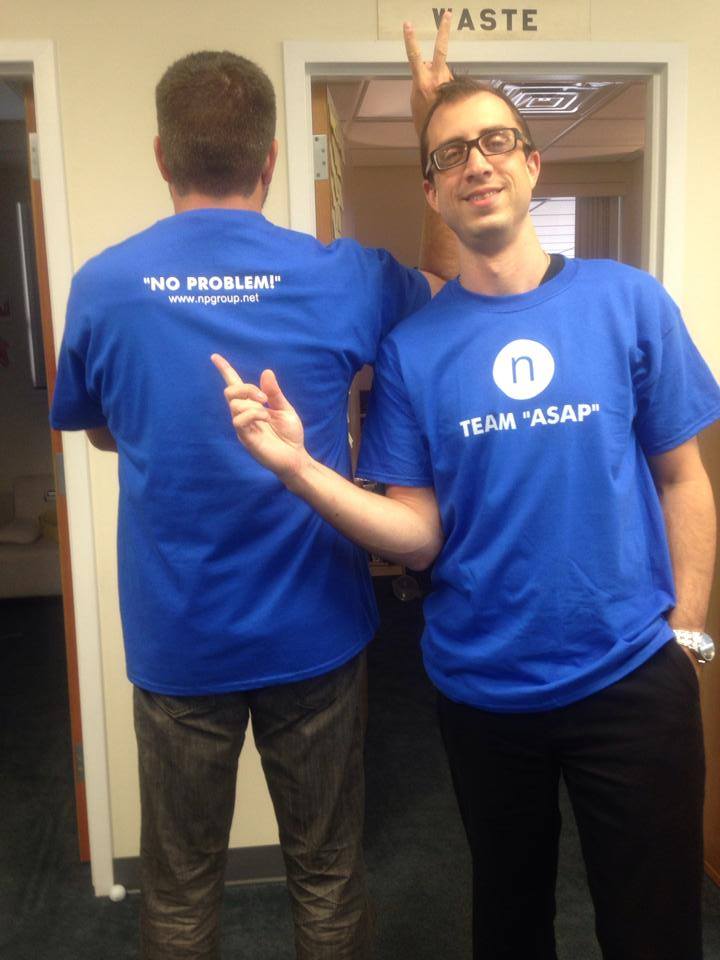 Have a Can-Do Attitude
Have a Can-Do Attitude
People hire problem solvers. People hire those who say "YES" to the challenge. No one wants to hear fifteen reasons why you can't do something; they want to hear how you can get something done. This is something tech people are notoriously guilty of. I am so often on calls with in-house tech guys who are poo-pooing (a technical term!) a project or a solution. I often want to tell them – dude, if you had a better attitude, you could do this yourself. The fact is, our industry is about solving problems. You can't solve problems with a defeatist attitude. Or worse, one that doesn't even recognize the problem.
By the way, a can-do attitude is literally the one hiring quality I care most about. Everyone has to be aligned with this ability, or else the entire ship will sink.
Pivot Often
I've never been afraid to pivot our focus or direction, business practice, or workflow if I thought it would make things better. Even as I write this, we're working on some subtle pivots to how we do things and the company's structure. There is always a way to do something, even just a small percentage better. If you are closed-minded and sure you are doing everything right, you miss out on opportunities. So always be open to a pivot and reconsideration of how you are doing things. I just assume I never have any idea what I'm doing - they call that imposters syndrome. It helps bring you to a level of accepting new approaches. Of course, this is not to say I'm not stubborn at times - aren't we all? You just have to be mindful of when you are getting in your own way and move on.
Learn From Experts & Community
I started by shying away from spending money on expertise, but eventually relented - and thank goodness I did. I have learned so much from the experts I learned to rely on. I studied the Blair Enns school of expertise, read the books of David C. Baker. I hired another agency consultant for a while, chartered accountants to do a tax study, hired more to do an R&D research study, and found the right lawyers who focus on the agency business. These services saved me money, made us operate smarter, and made me a better owner. And never at the expense of the client – we progressively got much better along the way. I also enjoy the communities that have popped up helping us in the agency space, especially the Bureau of Digital, whose events have really transformed so much about how we do business.
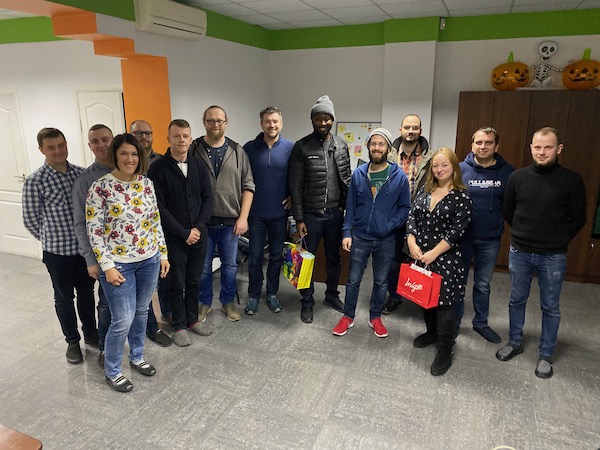 Build a Good Team
Build a Good Team
This should go without saying... But you are only as good as the folks you have around you. So building a quality team is important. Now look, many people have written books on the subject, so I'm not going to get into clichés. But I am going to tell you what's it's like being an employer from an owner's perspective. Growing a team is a great thing that comes with responsibility. As your team grows, your stresses grow accordingly. I don't just worry about my kids or my life, I worry about each employee's kids and their lives, too. I'm unsure I have admitted to it in the past, but with every pitch and every proposal, I sense the responsibility for everyone on the team, too - it can be stressful at times.  It isn't unusual for me to think that our team has cars and kids and student loans and houses and did I mention kids? I've lost count of how many we all have! And, to an extent, all of them are somewhat relying on me doing a decent job and making the right decisions.
It isn't unusual for me to think that our team has cars and kids and student loans and houses and did I mention kids? I've lost count of how many we all have! And, to an extent, all of them are somewhat relying on me doing a decent job and making the right decisions.
What helps, however, is knowing that the team is highly skilled, capable, and sharing our collective values and culture. Knowing that your team can take the "can do" attitude mentioned above, and take things from your plate really frees you up to take appropriate risks and make the decisions you need to make. I'm grateful for everyone on our team, which now is spread out around the country and the world.
Write, Write, and Write
I know a guy who is amazed I can turn out a blog of 2,000 words every week. For me, it isn't actually that hard. My posts are mostly conversational in style, and writing them usually doesn't take all that long. For new topics, writing provides me a way to learn. It helps with your organic traffic; it shows your expertise. It adds value to your company and domain. So regardless of what you do, you should be writing… regularly! You don't have to own the company to do this, either. So regardless of your role, contribute to the company blog or post your own content on medium. Other than a small case of carpal tunnel, you'll come out ahead.
Be Weary of Trendy
I wrote a blog post about this in the past, and much of what I said back then still holds true. I am not a trendy technologist or quick to recommend using new tools that are hot at the moment. The fact is, stylish tech doesn't align with business objectives very often. When it does, there always seems to be some risk to using it. In 20 years, I've seen so many platforms come and go. The ones that stick around are the ones that are always the safest to build on, and picking what new technology will be a future winner is much like picking stocks. It's hard to do. So much of our work is still, at its core, running on open-source technology such as the LAMP stack. Sure, we may have rotated MongoDB in to replace MySQL in some instances… But the gist of the stack and most components are similar. I've seen so many projects in my time that started by being developed on some flavor of the month and ended up being rebuilt shortly after because either the development team changed or some other factor came into play. If you are a non-technical project manager, product manager, or entrepreneur, stay conservative in your tech choices. It's better in the long run.
The Future
They say depression is thinking about the past, and anxiety is worrying about the future.
I'm not one to look backward, never really have been... "If only we had invested more time on our early social network, maybe I'd be wherever now." Or "if we had won that deal we lost or hired that guy we passed on." I honestly don't regret very much because I'm always looking forward. And, because with each loss, I take a win away from it, which lessens the sting.
The future, however, is another story. I think about that often. The agency space has changed so much. We went from being the few guys in the room who knew what we are doing to being in an overly saturated space with many who now claim they know what they are doing but really don't. Add onto that international competition, price pressure, and self-service models. And what is this "no-code" crap all about?!
I sometimes worry whether or not agencies will be needed in the future, but then I remind myself that the digital space is hyper-complex, and the training that happens to prep workers for this field is pretty bad. The most significant risk to agencies is internal hiring, but it simply doesn't make sense for many companies to hire someone who can work at an expert level in every discipline that agencies bring to the table. So, I'm bullish, for now, on what the future holds.
And to add to that, there is always a need for custom artistry. So much of what we do and what we pride ourselves on are "CUSTOM" solutions. In fact, it's where we work the hardest to rank from an SEO perspective. "Custom web development" or "custom web design" isn't going away. Sophisticated clients will always want bespoke solutions.
In wrapping up this post, and if you are still reading this - whether you are a client, friend, family member, or just a reader of the blog - thanks much for your support over the past 20 years - and going forward!
---PJC

